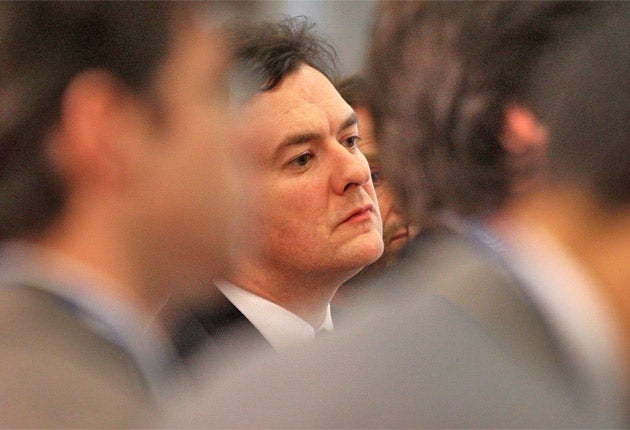Osborne's secret plan to raise tax – and scrap national insurance
Radical reform that has been shunned by past chancellors may be taken up by the Coalition

Income tax and national insurance could be merged as part of a drive to simplify the tax system by the Coalition Government.
The move is expected to be signalled by George Osborne in his Budget next Wednesday. Although such a huge change would take years to implement, the Chancellor is determined to be seen as a reformer and not just as the axeman who cleared the budget deficit he inherited from Labour.
The idea has been under discussion for years, but politicians have shied away from implementing it. Such an upheaval would be bound to create winners and losers, and the effective abolition of national insurance – currently at 11 per cent for employees, rising to 12 per cent next month – could be portrayed as a tax hike, taking the basic rate from 20p to 32p and top rate from 40p to 52p in the pound.
Politicians have raised national insurance to avoid putting up income tax. Labour, which had pledged not to raise tax rates, increased national insurance in 2002 to fund a budget boost for the NHS.
The contributory principle, dating back to the introduction of NI in 1911, was another reason for retaining the payments, but this has been eroded over the years and now only six state benefits depend wholly or in part on people's contributions: bereavement allowance, jobseeker's allowance, employment and support allowance, incapacity benefit, maternity allowance and the basic state pension.
Plans by the Work and Pensions Secretary, Iain Duncan Smith, to bring in a flat rate pension of £140 a week, based on residence rather than national insurance payments, would further weaken the principle. So could Mr Duncan Smith's proposal to streamline state benefits for people of working age into a universal credit.
One minister said yesterday: "The changes to benefits could tip the balance in favour of merging tax and national insurance. It would be a radical reform and lasting legacy for the Government. We don't want to be remembered for cuts, cuts and more cuts."
Mr Osborne will call next week's package a "Budget for growth" to answer criticism that the Coalition has a cuts strategy but no programme to create jobs and growth. Ministers have promised to attack the "enemies of enterprise" and cut red tape for business.
The proposed merger would be welcomed by small businesses. A survey of them by the Treasury's Office of Tax Simplification found almost unanimous support for the idea. In its interim report this month, the office said the two parallel systems distort behaviour as people try to limit their tax bills.
Get a free fractional share worth up to £100.
Capital at risk.
Terms and conditions apply.
ADVERTISEMENT
Get a free fractional share worth up to £100.
Capital at risk.
Terms and conditions apply.
ADVERTISEMENT
Its report admitted that the timescale to introduce such "major structural changes" might be lengthy, and said it would "not be an easy task" to ensure that there was no significant overall loss to the Exchequer or taxpayers. It would cut the time and cost of payroll calculations for employers, make it easier for the self-employed to complete tax forms, and reduce costs at HM Revenue & Customs.
In the current financial year, income tax and national insurance are forecast to raise £250bn – 45 per cent of total tax revenue – of which national insurance contributes £100bn and tax £150bn.
Critics of the tax system have long pointed out the anomalies caused by separate tax and national insurance payments.
A study by the Institute for Fiscal Studies last year said: "The current UK tax system is opaque and unnecessarily complex, imposing two entirely separate taxes on earnings – income tax and national insurance contributions. Recent changes have introduced a bizarre marginal rate structure, with marginal income tax rates rising from 40 per cent to 60 per cent on incomes between £100,000 and £112,950, then falling back to 40 per cent before rising again to 50 per cent."
Before last year's election, Labour announced that next month's 1 per cent rise would apply to both employees and employers, whose current rate is 12.8 per cent, to cut the deficit. The Coalition scrapped the rise for employers, instead raising VAT from 17.5 to 20 per cent, but retained it for employees.
Join our commenting forum
Join thought-provoking conversations, follow other Independent readers and see their replies
Comments
Bookmark popover
Removed from bookmarks